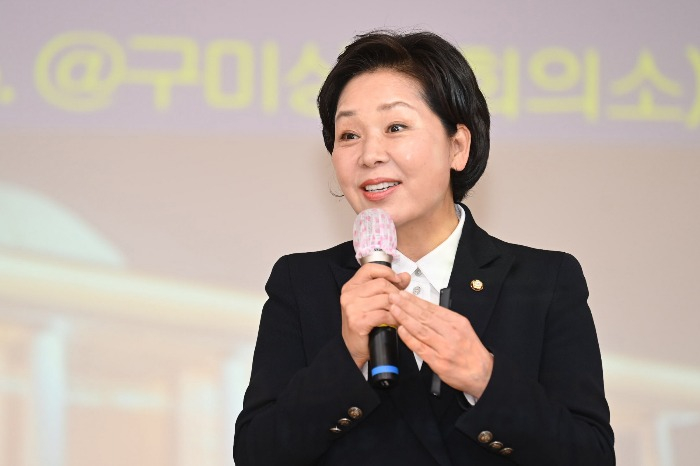Korean chipmakers
Rep. Yang Hyang-ja criticizes 8% tax cut for chipmakers as step backward
The finance ministry warned if the tax deduction rate for chipmakers reaches 20%, corporate tax revenue for 2024 will shrink by $2 bn
By Dec 23, 2022 (Gmt+09:00)
3
Min read
Most Read
LG Chem to sell water filter business to Glenwood PE for $692 million


Kyobo Life poised to buy Japan’s SBI Group-owned savings bank


KT&G eyes overseas M&A after rejecting activist fund's offer


StockX in merger talks with Naver’s online reseller Kream


Mirae Asset to be named Korea Post’s core real estate fund operator



South Korean politician Yang Hyang-ja, a Samsung Electronics Co. executive-turned-lawmaker, criticized her fellow lawmakers' decision to raise the percentage of tax benefits to Korean chipmakers by a smidgen in return for facility investment.
The initial tax break proposal was aimed at creating Korea's own version of Washington's CHIPS and Science Act of 2022.
Upon hearing about the hike in tax deduction rate from the current 6% to 8%, Yang asked rhetorically, “Why would you listen to a bureaucrat and not a general on the battlefield?”
Yang was implying that conservative and liberal lawmakers alike have abandoned Korean chipmakers amid growing concerns by the Ministry of Economy and Finance that the increased tax break for the semiconductor industry will lead to a drastic drop in its overall corporate tax revenue.
In August, a group of lawmakers led by Yang unveiled a new bill designed to triple the tax incentives for chipmakers, in a move to encourage more facility investment from the country's bread and butter industry.
The main takeaway of the bill included increasing the tax deduction rates for conglomerates to 20%, for medium-sized enterprises to 25%, and up to 30% for small and mid-sized companies.
Yang, who left the Democratic Party this year, accepted an offer from the ruling People Power Party to chair a special parliamentary committee on semiconductors.
But the discussion came to a halt when the finance ministry raised that should the new bill be passed, the corporate tax revenue for 2024 will shrink by 2.69 trillion won ($2.1 billion).
“The ruling and the opposition parties have agreed to the government’s proposed tax deduction rate increase of 8% for conglomerates and mid-tier enterprises, and 16% for small and mid-sized companies,” said People Power Party lawmaker Yoo Sung-kull in a phone conversation with The Korea Economic Daily.
In a statement released on Friday, Yang said, “The global standard for semiconductor manufacturers’ tax deduction based on investment is 25% and the agreed upon 8% is a step backward, not forward.”
The former Samsung executive stressed the move is akin to kicking a global semiconductor behemoth out of the peninsula.
Her logic is: When a semiconductor manufacturer can build a plant in the United States to receive a 25% tax deduction, why would it prefer to build one in Korea instead?
“The mere 8% tax deduction is like backtracking on the presidential campaign pledge,” Yang said.
The chipmaking industry also did not shy away from expressing disappointment.
“While we expected the tax deduction rate to increase to at least double digits, it is now apparent that the lawmakers’ discussions were just for the optics,” an industry insider said. The person added that the fact that Korean chipmakers cannot play on a level playing field is quite frustrating.
“Even though the semiconductor industry holds strategic values in national competitiveness, the benefits the domestic industry receives are low compared to their counterparts in other countries,” said Korea Semiconductor Industry Association (KSIA) Vice Chairman Lee Chang-han.
Lee added that counting pennies in times of “war” could lead to immeasurable losses in the long run.
Write to Jae-Yeon Ko at yeon@hankyung.com
Jee Abbey Lee edited this article.
More to Read
-
 Business & PoliticsTrump Jr. meets Korean business chiefs in back-to-back sessions
Business & PoliticsTrump Jr. meets Korean business chiefs in back-to-back sessionsApr 30, 2025 (Gmt+09:00)
-
 Korean chipmakersSamsung in talks to supply customized HBM4 to Nvidia, Broadcom, Google
Korean chipmakersSamsung in talks to supply customized HBM4 to Nvidia, Broadcom, GoogleApr 30, 2025 (Gmt+09:00)
-
 EnergyLS Cable breaks ground on $681 mn underwater cable plant in Chesapeake
EnergyLS Cable breaks ground on $681 mn underwater cable plant in ChesapeakeApr 29, 2025 (Gmt+09:00)
-
 Business & PoliticsUS tariffs add risk premium to dollar assets: Maurice Obstfeld
Business & PoliticsUS tariffs add risk premium to dollar assets: Maurice ObstfeldApr 29, 2025 (Gmt+09:00)
-

Comment 0
LOG IN


